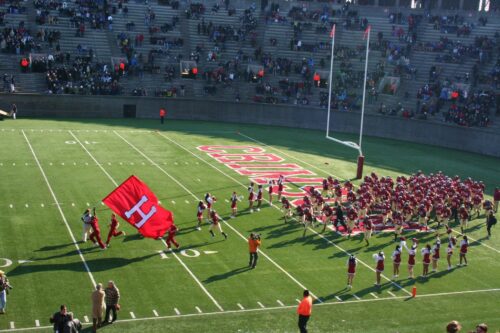A look into the postseason ban on Ivy League football
If you’ve seen enough sports movies, you are bond to have run across one where the climax of the plot is the big bad rules committee stopping a kid or team from playing in a gam. The familiar cheer of “Let them play!” rings out from the assembled crowd, and ultimately the rules official realizes that the rule is stupid and allows the team to play. In 1945, the Ivy League, playing the part of the big bad rules official in our drama, banned teams from certain types of postseason competition. Throughout the years, the Ivy League has changed their stance on this rule when it comes to every sport except football. Even with the growing chorus of “Let them play!” from coaches, players, and fans, the Ivy League has remained the big bad rules official. So, it is time to add one more article to the cacophony of screams to “Let them play!”
Before I go any further, I want to make two things clear. First, the desire for Harvard to compete against the best in the country during the playoffs is not crazy or some pipe dream. Harvard is very good for an FCS football team. (FCS is the division directly below the FBS, which is home to traditional programs like Alabama, U.S.C. and Notre Dame. The FCS champion is determined by a 16-team single-elimination tournament.) Harvard has been ranked in the top 20 of the FCS polls at least once in each of the last three seasons, and last year, Harvard was the only team in the country in either the FBS or FCS to finish the season undefeated. Each year, Harvard has numerous players on All-American teams and has multiple players signed to NFL contracts.
The second thing you need to know is that the FCS organization is not holding back the Ivy League from participating in the playoffs. The FCS guarantees a playoff spot for the champion of all twelve of its member conferences and has offered a spot to the Ivy League in years past. The Ivy League simply does not accept.
So, why does the Ivy League continue to play the role of the big bad official? The league offers two explanations. The first is that allowing teams into the playoffs could hamper a player’s academic success because the playoffs traditionally occur during reading week and exam week. That may be true, but the Ivy League encourages all of its other students to pursue extracurricular interests that could hurt their academics. Can you imagine Harvard telling a debate team or science team to skip a championship because it was during a reading week? Furthermore, for other sports, Harvard allows the athletes to not only miss school during the exam week, but to take exams on the road. Why is football treated differently?
The second reason that the Ivy League offers for their postseason ban is the potential for a playoff game to ruin traditions within the Ivy League. Without a postseason, the Ivy League can ensure that Harvard-Yale can be the final game of the season for both teams. However, as Taylor Swift said, “players wanna play, play, play!” Yes, Harvard-Yale is important, but it does not mean more than the opportunity to test oneself against the best of the best and attempt to be named a national champion. When looked at through the eyes of a player, the importance of Harvard-Yale diminishes. Also, as a fan, I want to see Harvard play teams from across the country to see just how good they are. It would be even more exciting for me to watch Harvard play for a national championship than play for an Ivy League championship.
Last week, Harvard defeated Georgetown 45-0 to move to 3-0 on the season. The game was comfortably in the bag by the end of the third quarter. In all three games, the Crimson have comfortably blown out opponents and been left to play back-ups during the second half. And, that trend is not going to change come Ivy League play. Harvard remains the favorite in the league to bring home a third-straight title, and with the exception of Yale and Princeton, few games this year will be close. Football just should not be played this way. Football is one of the most passionate, combative games in the world, but that drama is stripped away when the best teams are not allowed to play each other.
The ban on Ivy League football playoffs is the relic of a time long past. Harvard can be competitive on the national stage and deserves the chance to play among the best of the best. If the big bad rules official does not want to allow them, it is an attempt to hold on to the relic that was. So, join me like the crowds in the movies, and hopefully the Ivy League will one day “Let them play!”
Peyton Fine ’17 (peytonfine@college.harvard.edu) hopes to one day see Harvard playing against the top teams in the nation. It would be great to say we have a national championship in football, even if it is FCS.

